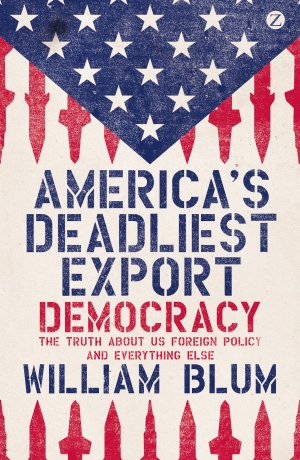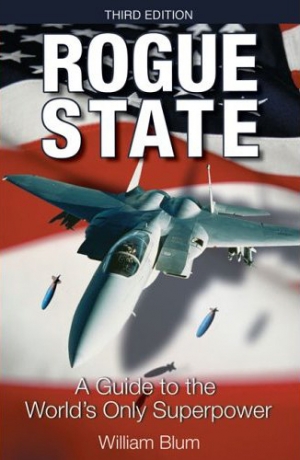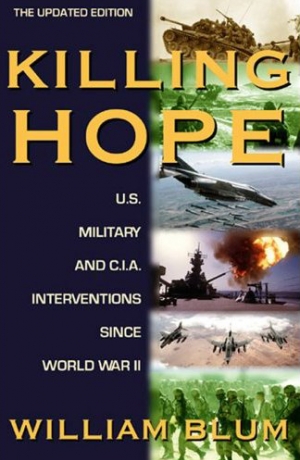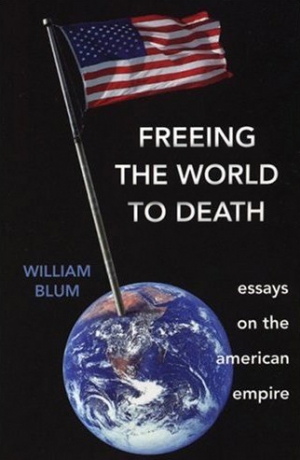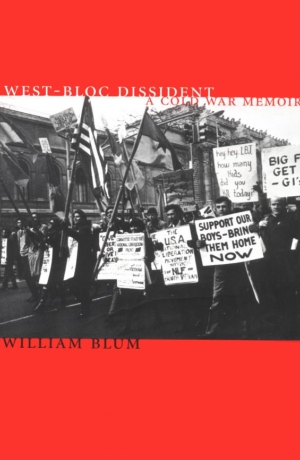The Anti-Empire Report #106
By William Blum – Published July 3rd, 2012
Julian Assange
I’m sure most Americans are mighty proud of the fact that Julian Assange is so frightened of falling into the custody of the United States that he had to seek sanctuary in the embassy of Ecuador, a tiny and poor Third World country, without any way of knowing how it would turn out. He might be forced to be there for years. “That’ll teach him to mess with the most powerful country in the world! All you other terrorists and anti-Americans out there — Take Note! When you fuck around with God’s country you pay a price!”
How true. You do pay a price. Ask the people of Cuba, Vietnam, Chile, Yugoslavia, Iraq, Iran, Haiti, etc., etc., etc. And ask the people of Guantánamo, Diego Garcia, Bagram, and a dozen other torture centers to which God’s country offers free transportation.
You think with the whole world watching, the United States would not be so obvious as to torture Assange if they got hold of him? Ask Bradley Manning. At a bare minimum, prolonged solitary confinement is torture. Before too long the world may ban it. Not that that would keep God’s country and other police states from using it.
You think with the whole world watching, the United States would not be so obvious as to target Assange with a drone? They’ve done it with American citizens. Assange is a mere Aussie.
And Ecuador and its president, Rafael Correa, will pay a price. You think with the whole world watching, the United States would not intervene in Ecuador? In Latin America, it comes very naturally for Washington. During the Cold War it was said that the United States could cause the downfall of a government south of the border … with a frown. The dissolution of the Soviet Union didn’t bring any change in that because it was never the Soviet Union per se that the United States was fighting. It was the threat of a good example of an alternative to the capitalist model.
For example, on January 21, 2000 in Ecuador, where almost two-thirds live in poverty, a very large number of indigenous peasants rose up in desperation and marched to the capital city of Quito, where they were joined by labor unions and some junior military officers (most members of the army being of indigenous stock). This coalition presented a list of economic demands, seized the Congress and Supreme Court buildings, and forced the president to resign. He was replaced by a junta from the ranks of the new coalition. The Clinton administration was alarmed. Besides North American knee-reflex hostility to anything that looks or smells like a leftist revolution, Washington had big plans for a large military base in Manta (later closed by Correa). And Colombia — already plagued by leftist movements — was next door.
The US quickly stepped in to educate the Ecuadorean coalition leaders as to the facts of Western Hemispheric imperial life. The American embassy in Quito … Peter Romero, Assistant Secretary of State for Latin America and Western Hemispheric Affairs … Sandy Berger, National Security Adviser to President Clinton … Undersecretary of State Thomas Pickering … all made phone calls to Ecuadorian officials to threaten a cutoff in aid and other support, warning that “Ecuador will find itself isolated”, informing them that the United States would never recognize any new government the coalition might set up, there would be no peace in Ecuador unless the military backed the vice president as the new leader, and the vice president must continue to pursue neoliberal “reforms”, the kind of IMF structural adjustment policies which had played a major role in inciting the uprising in the first place.
Within hours the heads of the Ecuadorian army, navy and air force declared their support for the vice president. The leaders of the uprising fled into hiding. And that was the end of the Ecuadorian revolution of the year 2000. 1
Rafael Correa was first elected in 2006 with a 58% majority, and reelected in 2009 with a 55% majority; his current term runs until August 2013. The American mainstream media has been increasingly critical of him. The following letter sent in January to the Washington Post by the Ecuadoran ambassador to the United States is an attempt to clarify one of the issues.
Letter to the Editor:
We were offended by the Jan. 12 editorial “Ecuador’s bully,” which focused on a lawsuit brought by our president, Rafael Correa, after a newspaper claimed that he was guilty of ordering troops to fire on innocent citizens during a failed coup in 2010. The president asked the publishers to release their evidence or a retraction. When they refused, he sued, as any citizen should do when recklessly wronged.
No journalist has gone to prison or paid a significant fine in the five years of the Correa presidency. Media criticism — fair and unfair, sometimes with malice — of the government appears every day. The case involving the newspaper is on appeal. When the judicial process ends, the president has said, he will waive some or all of the penalties provided he gets a retraction. That is a common solution to libel and slander cases in the United States, I believe.
Your writer uses obnoxious phrases such as “banana republic,” but here is the reality of today’s Ecuador: a highly popular, stable and progressive democracy for the first time in decades.
Nathalie Cely, Washington
No shelter from the drones of infinite justice or the bacteria of enduring freedom
Afghanistan president Hamid Karzai said recently that he had had an argument with Gen. John Allen, the top US commander in Afghanistan, about the issue of American drone attacks in Afghanistan, following yet another deadly airstrike that killed a number of civilians. Karzai asked Allen an eminently reasonable question: “Do you do this in the United States?” The Afghan president added: “There is police action every day in the United States in various localities. They don’t call an airplane to bomb the place.” 2
Karzai’s question to Allen was rhetorical of course, for can it be imagined that American officials would bomb a house in an American city because they suspected that certain bad guys were present there? Well, the answer to that question is that it can be imagined because they’ve already done it.
In Philadelphia, Pennsylvania. On May 13, 1985, a bomb dropped by a police helicopter burned down an entire block, some 60 homes destroyed, 11 dead, including several small children. The police, the mayor’s office, and the FBI were all involved in this effort to evict an organization called MOVE from the house they lived in.
The victims were all black of course. So let’s rephrase our question. Can it be imagined that American officials would bomb a house in Beverly Hills or the upper east side of Manhattan? Stay tuned.
And what else can we imagine about a society that’s been super militarized, that’s at war with much of the world, and is convinced that it’s on the side of the angels and history? Well, the Boston transit system, MBTA, recently announced that in conjunction with Homeland Security they plan to release dead bacteria at three stations during off-hours this summer in order to test sensors that detect biological agents, which terrorists could release into subway systems. The bacterium, bacillus subtilis, is not infectious even in its live form, according to the government. 3
However, this too has a precedent. During five days in June, 1966 the Army conducted a test called “A Study of the Vulnerability of Subway Passengers in New York City to Covert Attack with Biological Agents”. Trillions of bacillus subtilis variant niger were released into the subway system during rush hours, producing aerosol clouds. The report on the test noted that “When the cloud engulfed people, they brushed their clothing, looked up at the grate [at street level] and walked on.” 4 The wind of passing trains spread the bacteria along the tracks; in the time it took for two trains to pass, the bacteria were spread from 15th Street to 58th Street. 5 It is not known how many people later became ill from being unsuspecting guinea pigs because the United States Army, as far as is known, exhibited no interest in this question.
For the planned Boston test the public has not been informed of the exact days; nor is it known how long the bacteria might linger in the stations or what the possible danger might be to riders whose immune system has been weakened for any reason.
It should be noted that the New York subway experiment was only one of many such experiments. The Army has acknowledged that between 1949 and 1969, 239 populated areas from coast to coast as well as US overseas territories were blanketed with various organisms during tests designed to measure patterns of dissemination in the air, weather effects, dosages, optimum placement of the source, and other factors. Such testing was supposedly suspended after 1969. 6
Government officials have consistently denied that the biological agents used could be harmful despite an abundance of expert and objective scientific evidence that exposure to heavy concentrations of even apparently innocuous organisms can cause illness, at a minimum to the most vulnerable segments of the population — the elderly, children, and those suffering from a variety of ailments. “There is no such thing as a microorganism that cannot cause trouble,” George Connell, assistant to the director of the Centers for Disease Control and Prevention, testified before the Senate in 1977. “If you get the right concentration at the right place, at the right time, and in the right person, something is going to happen.” 7
The United States has used biological weapons abroad as well, repeatedly, not for testing purposes but for hostile purposes. 8 So what will the land which has the highest (double) standards say when such weapons are used against it? Or when foreign drones hit American cities? Or when American hi-tech equipment is sabotaged by a cyber attack as the US has now admitted doing to Iran? A year ago the Pentagon declared that “computer sabotage coming from another country can constitute an act of war. … If you shut down our power grid, maybe we will put a missile down one of your smokestacks,” said a US military official. 9
“The true hypocrite is the one who ceases to perceive his deception, the one who lies with sincerity.” – André Gide, French Author, 1869-1951
Barack Obama, his mother, and the CIA
In his autobiography, Dreams From My Father, Barack Obama writes of taking a job at some point after graduating from Columbia University in 1983. He describes his employer as “a consulting house to multinational corporations” in New York City, and his functions as a “research assistant” and “financial writer”.
Oddly, Obama doesn’t mention the name of his employer. However, a New York Times story of October 30, 2007 identifies the company as Business International Corporation. Equally odd is that the Times did not remind its readers that the newspaper itself had disclosed in 1977 that Business International had provided cover for four CIA employees in various countries between 1955 and 1960. 10
The British journal, Lobster — which, despite its incongruous name, is a venerable international publication on intelligence matters — has reported that Business International was active in the 1980s promoting the candidacy of Washington-favored candidates in Australia and Fiji. 11 In 1987, the CIA overthrew the Fiji government after but one month in office because of its policy of maintaining the island as a nuclear-free zone, meaning that American nuclear-powered or nuclear-weapons-carrying ships could not make port calls. 12 After the Fiji coup, the candidate supported by Business International, who was much more amenable to Washington’s nuclear desires, was reinstated to power — R.S.K. Mara was Prime Minister or President of Fiji from 1970 to 2000, except for the one-month break in 1987.
In his book, not only doesn’t Obama mention his employer’s name; he fails to say exactly when he worked there, or why he left the job. There may well be no significance to these omissions, but inasmuch as Business International has a long association with the world of intelligence, covert actions, and attempts to penetrate the radical left — including Students for a Democratic Society (SDS) 13 — it’s reasonable to wonder if the inscrutable Mr. Obama is concealing something about his own association with this world.
Adding to the wonder is the fact that his mother, Ann Dunham, had been associated during the 1970s and 80s — as employee, consultant, grantee, or student — with at least five organizations with intimate CIA connections during the Cold War: The Ford Foundation, Agency for International Development (AID), the Asia Foundation, Development Alternatives, Inc., and the East-West Center of Hawaii. 14 Much of this time she worked as an anthropologist in Indonesia and Hawaii, being in good position to gather intelligence about local communities.
As one example of the CIA connections of these organizations, consider the disclosure by John Gilligan, Director of AID during the Carter administration (1977-81). “At one time, many AID field offices were infiltrated from top to bottom with CIA people. The idea was to plant operatives in every kind of activity we had overseas, government, volunteer, religious, every kind.” 15 And Development Alternatives, Inc. is the organization for whom Alan Gross was working when arrested in Cuba and charged with being part of the ongoing American operation to destabilize the Cuban government.
How the owners of a society play with their property
The Supreme Court of the United States has just upheld the constitutionality of President Obama’s health care law, the Affordable Care Act. Liberals as well as many progressives are very pleased, regarding this as a victory for the left.
Under the new law, people can benefit in one way or another depending on the following factors:
Their age; whether their income is at or below 133 percent of the federal poverty level; whether their parents have a health plan; whether they use tobacco; what state they live in; whether they have a pre-existing medical condition; whether they qualify to buy health insurance through newly-created market places known as “exchanges”; and numerous other criteria … They can obtain medical insurance in a “competitive insurance market” (emphasis on the “competitive”); they can perhaps qualify for various other kinds of credits and tax relief if they meet certain criteria … The authors of the Act state that it will save thousands of dollars in drug costs for Medicare beneficiaries by closing a coverage gap called the “donut hole” … They tell us that “It keeps insurance companies honest by setting clear rules that rein in the worst insurance industry abuses.”
That’s a sample of how health care looks in the United States of America in the 21st century, with a complexity that will keep a small army of lawyers busy for years to come. Ninety miles away, in the Republic of Cuba, it looks a bit different. If you feel sick you go to a doctor. You’re automatically qualified to receive any medical care that’s available and thought to be suitable. The doctor treats you to the best of his or her ability. The insurance companies play no role. There are no insurance companies. You don’t pay anything. You go home.
The Affordable Care Act will undoubtedly serve as a disincentive to the movement for single-payer national health insurance, setting the movement back for years. The Affordable Care Act was undoubtedly designed for that purpose.
Notes
- Washington Post, January 23, 2000, p.1; “The coup in Ecuador: a grim warning”, World Socialist Web Site, February 2, 2000; Z Magazine (Massachusetts), February 2001, pp.36-7
- Washington Post, June 12, 2012
- Beacon Hill Patch (Boston), “MBTA to Spread Dead Bacteria on Red Line in Bio-Terror Test”, May 18, 2012
- Leonard Cole, Clouds of Secrecy: The Army’s Germ Warfare Tests Over Populated Areas (1990), pp.65-9
- New York Times, September 19, 1975, p.14
- “Biological Testing Involving Human Subjects by the Department of Defense”, 1977, Hearings before the Subcommittee on Health and Scientific Research of the Committee on Human Resources, US Senate, March 8 and May 23, 1977; see also William Blum, Rogue State, chapter 15
- Senate Hearings, op. cit., p.270
- Rogue State, op. cit., chapter 14
- Wall Street Journal, May 30, 2011
- New York Times, December 27, 1977, p.40
- Lobster magazine, Hull, UK, #14, November 1987
- Rogue State, op. cit., pp.199-200
- Carl Oglesby, Ravens in the Storm: A Personal History of the 1960s Antiwar Movement (2008), passim
- Wikipedia entry for Ann Dunham
- George Cotter, “Spies, strings and missionaries”, The Christian Century (Chicago), March 25, 1981, p.321
Any part of this report may be disseminated without permission, provided attribution to William Blum as author and a link to williamblum.org is provided.
